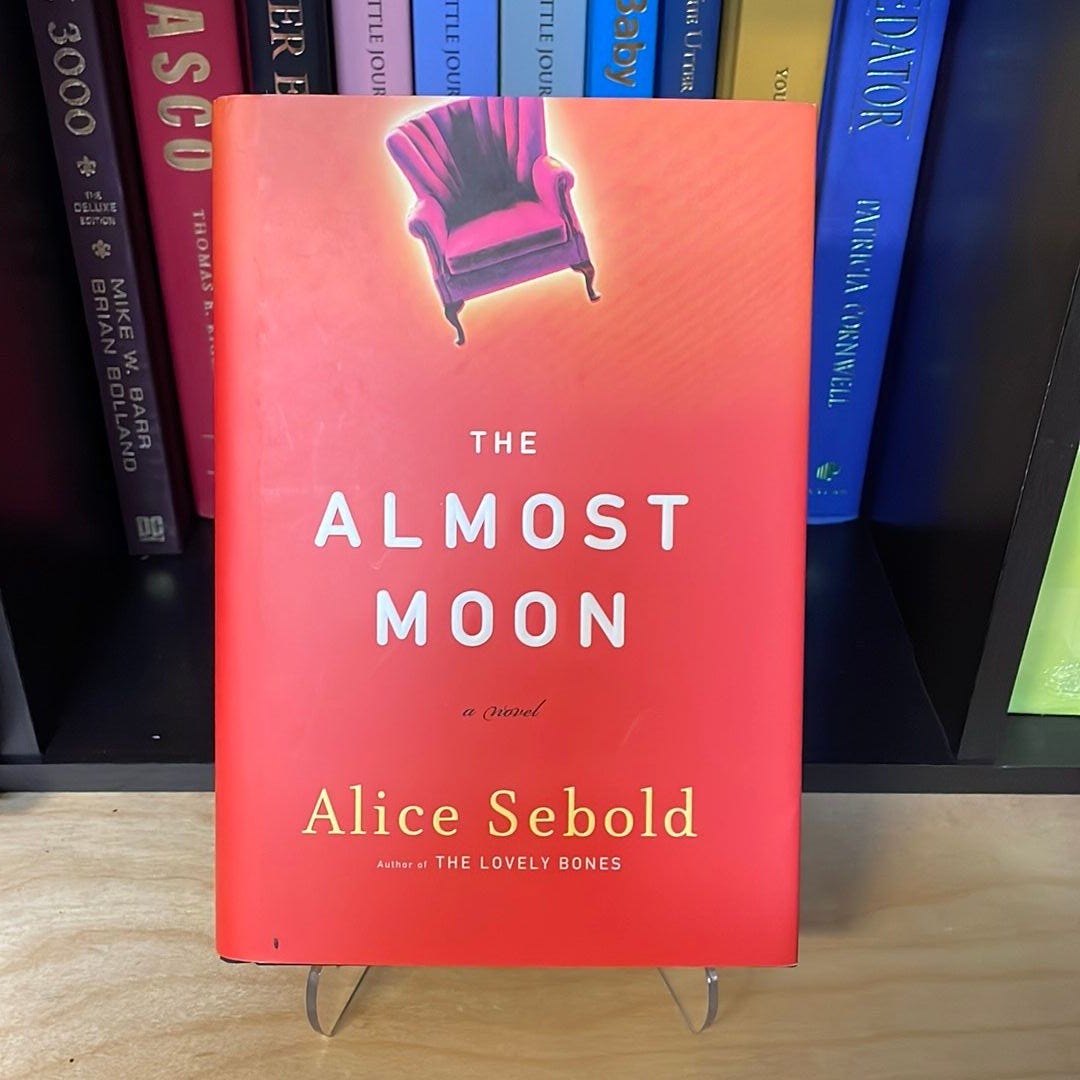Review of “The Almost Moon,” by Alice Sebold, 2007. New York: Back Bay Books/Little, Brown & Company, paper, 291 pages.
Social workers, counselors, and street helpers will find this book by Sebold a very interesting one indeed. However, there is a lot of difficult stuff to crawl through in the book, and readers are warned it is not a pleasant story. Instead, it is a sad one but one which has its importance for various reasons.
Helping others is an honorable endeavor. However, providing that help is sometimes overwhelming to many people. This book raises many questions as much as it answers others.
This novel is another bestseller written by Alice Sebold and highly controversial. Sebold just puts out there some of the most candid and straightforward passages for us to try to understand—not grammatically but spiritually. I offer my humble comments and ideas here on the book.
“The Almost Moon” is a story of a middle-aged woman, Helen, who has been the main caregiver for her mother for many years. Her father has been out of the picture.
The mother suffers from dementia, and Helen suffers from trying to take care of her—and deal with her abuse and insults.
Helen kills her mother. We know this from the book cover and from the hints and recommendations given in the recommendations from various publications and writers.
The story might help readers to think more about the difficulties and stress of dealing with—and trying to care for—an elderly parent who starts to not recognize the adult child. Although I will not provide lots of details here, I will emphasize this is a good book for caregivers to read.
The book would be wonderful for helping caregivers come to terms with their duties and better understand their feelings…
It can help caregivers explore the wide range of feelings they have—duty, guilt, love, exhaustion, fear, hope, disappointment, and many other strong emotions. It is hard to suddenly be the adult in the room—after a lifetime of being the child.
It is also an important book for counselors and therapists needing more understanding of the stress and confusion that patients have when dealing with older parents with dementia.
Judith Cruz and other experts have written recently about the topics one needs to consider in helping adults with dementia. One such book, *“The Dementia Caregiver's Survival Guide (2003) is helpful in providing useful information on how to approach the challenges. Shifting from child to adult/caregiver is a difficult journey for some.
The book by Sebold could serve as a dramatic springboard in taking book club members—or adult caregivers—into the next step. The next step is namely looking at books by Cruz to provide some solutions to the myriad of questions raised in the Sebold book.
The Sebold book on the literature and fiction side has its uses also. The book would also be awesome for teaching symbols, character development, and metaphor—I would have to say. This should not get lost in a more literal reading of the book.
The University of Wisconsin-Madison, my alma mater, is mentioned…
University of Wisconsin–Madison.
.
That makes this story just about book #100 I have read that does so. I am a Badger!
Artists, writers, caregivers, and of course teachers of writing will make good use of this novel. I have not read Sebold’s other books but would love to do so!
The book includes and interview of the author. There is also a book club section at the back with 12 pretty good questions for reflection and conversation. I would add more on metaphor, especially.
.
.
For further reading about being a caregiver to an adult with dementia, please see:
The Caregiver's Guide to Dementia: Practical Advice for Caring for Yourself and Your Loved One (Caregiver's Guides), by Gail Weatherhill, 2020. Callisto Publishing.
DEALING WITH DEMENTIA FOR CAREGIVERS: Real-World Advice to Prevent & Relieve Crisis Situations, Manage Long Care Hours, Alleviate the Burden You Feel & Cope with Daily Frustrations, by S. R. Hatton, 2024. S. R. HATTON PUBLISHING.
* “The Dementia Caregiver's Survival Guide: An 11-Step Plan to Understand the Disease and How To Cope with Financial Challenges, Patient Aggression, and Depression Without Guilt, Overwhelm, or Burnout,” by Judith Cruz, 2023. Unlimited Concepts, Paperback.
Other Related Books from Unlimited Concepts Meant to Help: https://bookscouter.com/publisher/unlimited-concepts






